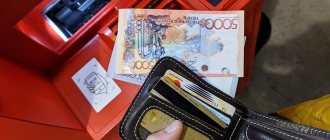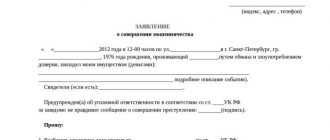The popularity and convenience of non-cash payments attract not only ordinary citizens, but also scammers. An example of this is statistics. Thus, in the first half of 2021, 6,613 cases of fraud using electronic means of payment were registered, which is 8 (!) times more than in the same period in 2021. Let us note that the crime provided for in Article 159.3 of the Criminal Code of the Russian Federation is one of the most complex and difficult to investigate forms of theft, therefore the act is characterized by a high degree of latency.
Let's consider the composition of a simple fraud using electronic means of payment:
- Objective side: theft of other people's funds through the use of electronic means of payment. An electronic means of payment means a means or method that allows a citizen to draw up, certify and transmit orders for the purpose of transferring money within the framework of applicable forms of non-cash payments using information and communication technologies, electronic storage media, including payment cards, as well as others. technical devices (clause 19, article 3 of the Federal Law “On the National Payment System”). These include not only bank cards, but also, for example, electronic wallets.
- Object: property relations. As an additional object, we can consider public relations in the field of ensuring uninterrupted, efficient and accessible provision of money transfer services.
- Subject: a sane individual who has reached the age of 16 years.
- Subjective side: only direct intent, the goal is selfish.
Note that the previously considered article established liability only for fraud using bank cards. Since May 4, 2021, the disposition of the article has undergone changes.
Commentary to Art. 159 of the Criminal Code of the Russian Federation
Fraud is a form of theft. Objective and subjective signs of fraud as a form of theft are disclosed in the commentary to Art. 158 of the Criminal Code of the Russian Federation.
The elements of fraud are complex and alternative.
The objective side of fraud is expressed in alternative acts, consequences in the form of property damage, causation and a specific method (deception or breach of trust).
Alternative acts are defined in the law as:
1) theft of someone else's property;
2) acquisition of rights to someone else's property.
In the first case, we are talking about a traditional type of theft of someone else's movable property, associated with its removal from the possession of the victim. In the second case, fraud goes beyond the scope of theft; the subject of fraud becomes not only movable objects of the material world, but also real estate, uncertificated securities, non-cash money and any other property to which the perpetrator acquires the right. This type of fraud is equated to theft with all the ensuing legal consequences. Moreover, it is not only equated to theft, but also corresponds to all the signs of theft specified in the law. It’s just that these signs are understood more broadly than in relation to traditional theft (theft or robbery).
The right to property should be recognized as any right to a thing (both real and obligatory), including the right to receive a thing (for example, non-cash money). The question of understanding the right to property in science remains controversial. There is an opinion that as a right to property in Art. 159 of the Criminal Code of the Russian Federation can only be understood as the right of ownership. However, this point of view seems controversial, since it excludes liability for fraudulent theft of non-cash money, which is not directly related to the right of ownership and represents an obligatory right of claim arising from a bank account agreement. In addition, this point of view excludes liability for the fraudulent acquisition of rights to municipal apartments, the use of which occurs on the basis of social rent. Meanwhile, such apartments often become the subject of fraud, and the methods used by criminals differ little from the methods used in the theft of privatized and other private apartments. There is no basis in law for a narrow understanding of the “right to property” in the narrow sense of property rights.
The acquisition of a right must be understood as its registration. In reality, the fraudster, of course, does not acquire any rights; he only imitates them, confirming non-existent rights with documents or otherwise.
The method of theft in fraud is deception or breach of trust.
Unlike other forms of theft provided for by Chapter 21 of the Criminal Code of the Russian Federation, fraud is committed by deception or abuse of trust, under the influence of which the owner of the property or another person or an authorized body transfers the property or the right to it to other persons or does not interfere with the seizure of this property or the acquisition of the right against him by other persons (clause 1 of the Resolution of the Plenum of the Supreme Court of the Russian Federation of December 27, 2007 N 51 “On judicial practice in cases of fraud, misappropriation and embezzlement”).
Deception as a method of committing theft or acquiring the right to someone else's property, liability for which is provided for in Art. 159 of the Criminal Code of the Russian Federation, may consist of deliberate communication of knowingly false information that does not correspond to reality, or in silence about true facts, or in deliberate actions (for example, in the provision of counterfeit goods or other subject of a transaction, the use of various deceptive techniques when paying for goods or services, or when playing games of chance, simulating cash transactions, etc.) aimed at misleading the owner of the property or another person. False information reported during fraud (information that is kept silent) can relate to any circumstances, in particular to legal facts and events, quality, value of property, identity of the perpetrator, his powers, intentions (clause 2 of the Resolution of the Plenum of the Supreme Court of the Russian Federation of December 27 2007 N 51 “On judicial practice in cases of fraud, misappropriation and embezzlement”).
An example of passive deception is a situation when the seller hides the unsuitability of a thing for practical use or does not report any of its significant shortcomings known to him, sells a brass product at the price of gold, sells securities of a liquidated organization, hides fraudulent gambling techniques, hides the fact of impossibility or an extremely low probability of winning a lottery or a controlled slot machine, etc.
In fraud, the deception must cause a complex chain of cause and effect to develop. The result of deception should be the delusion of a person (not necessarily the owner - this could be his relative, employee, bank employee, etc.) regarding the facts that are important when making a decision on the transfer of property. The result of this misconception must be an action aimed at transferring property or rights to it to the fraudster. Ultimately, damage is caused in the form of loss of property (it should be noted that this kind of damage is typical for both types of fraud, both for fraudulent theft and for fraudulent acquisition of rights to property). In any case, the purpose of deception is the voluntary transfer by the victim or other person of property to the perpetrator free of charge or in exchange for property that does not exist in reality or is of low value. If there has been deception, but its purpose is not to transfer property (the right to it) to the fraudster, the act cannot be qualified as theft by deception. For example, if deception is used to enter a home for the purpose of committing theft, robbery or robbery, the act is classified as theft, robbery or robbery, and not as fraud. “Courts should keep in mind that a sign of fraud is the voluntary transfer by the victim of property or the right to property to the perpetrator under the influence of deception or abuse of trust” (clause 12 of the Resolution of the Plenum of the Supreme Court of the USSR of September 5, 1986 No. 11 “On judicial practice in cases on crimes against personal property").
Even if there was deception and transfer of property as a result of deception, but the victim did not suffer property damage, there is no fraud (for example, the victim purchases a low-quality product at an adequate price).
“Abuse of trust in fraud is the use for personal gain of a trust relationship with the owner of property or another person authorized to make decisions on the transfer of this property to third parties. Trust can be conditioned by various circumstances, for example, the official position of a person or the personal or family relationship of a person with the victim. Abuse of trust also occurs in cases where a person assumes obligations when he obviously has no intention of fulfilling them for the purpose of freely using someone else’s property for his own benefit or for the benefit of third parties or acquiring the right to it (for example, an individual receiving a loan, an advance for the performance of works, services, prepayment for the supply of goods, if it did not intend to repay the debt or otherwise fulfill its obligations)" (clause 3 of the Resolution of the Plenum of the Supreme Court of the Russian Federation of December 27, 2007 N 51 "On judicial practice in cases of fraud, misappropriation and waste"). It should be taken into account that if a person not only abuses the trust of the victim, but embezzles or wastes the property entrusted to him, the act is not qualified under Art. 159, and according to Art. 160 of the Criminal Code of the Russian Federation.
Breach of trust in fraud is combined with deception. The perpetrator tries to gain the trust of the victim before deceiving him. In other cases, the offender may deceive the victim in order to gain their trust. Breach of trust cannot be considered as an independent method of theft during fraud, although the law has grounds for this, for qualifying the act under Art. 159 of the Criminal Code, it is necessary that abuse of trust be associated with deception. For example, failure to repay a debt in itself is not fraud if there was no deception in intent at the time the money was received. “In cases where a person receives someone else’s property or acquires the right to it, without intending to fulfill the obligations associated with the conditions for the transfer of said property or right to him, as a result of which the victim suffers material damage, the act should be qualified as fraud if the intent directed to steal someone else's property or acquire the right to someone else's property, arose in a person before receiving someone else's property or the right to it. The presence of intent to steal may be evidenced, in particular, by the person’s deliberate lack of real financial ability to fulfill the obligation or the necessary license to carry out activities aimed at fulfilling his obligations under the contract, the person’s use of fictitious statutory documents or fake letters of guarantee, concealment of information about the presence of debts and pledges of property, the creation of false enterprises acting as one of the parties to the transaction. Courts should take into account that these circumstances in themselves cannot prejudge the court’s conclusions about a person’s guilt in committing fraud. In each specific case, it is necessary, taking into account all the circumstances of the case, to establish that the person obviously did not intend to fulfill his obligations" (clause 5 of the Resolution of the Plenum of the Supreme Court of the Russian Federation of December 27, 2007 N 51 "On judicial practice in cases of fraud, misappropriation and embezzlement ").
It should also be noted that in the absence of deception in intentions at the time of receiving a loan, advance, etc. subsequent failure to fulfill an obligation, even intentionally, in principle cannot be considered fraud due to the absence of the subject of theft. Money received as a loan, either as an advance or prepayment, at the moment of its receipt becomes the property of the debtor, the creditor loses his rights to this money. Failure to fulfill an obligation does not and cannot entail the acquisition by the debtor of any rights to any property.
The theft of someone else's property or the acquisition of the right to it by deception or abuse of trust, committed using an official document forged by this person, granting rights or releasing from obligations, is qualified as a set of crimes provided for in Part 1 of Art. 327 of the Criminal Code of the Russian Federation and the corresponding part of Art. 159 of the Criminal Code of the Russian Federation. If a person forged an official document, but due to circumstances beyond his control did not actually use this document, the act should be qualified under Part 1 of Art. 327 of the Criminal Code of the Russian Federation. The act must be qualified in accordance with Part 1 of Art. 30 of the Criminal Code of the Russian Federation as preparation for fraud, if the circumstances of the case indicate that the person’s intent included the use of a forged document to commit crimes under Part 3 or 4 of Art. 159 of the Criminal Code of the Russian Federation. In the event that a person used a forged document he himself produced for the purpose of stealing someone else’s property by deception or abuse of trust, but due to circumstances beyond his control was unable to seize the victim’s property or acquire the right to someone else’s property, the act should be qualified as a set of crimes provided for in Part 1. 1 tbsp. 327 of the Criminal Code of the Russian Federation, as well as Part 3 of Art. 30 of the Criminal Code of the Russian Federation and, depending on the circumstances of a particular case, the relevant part of Art. 159 of the Criminal Code of the Russian Federation (clause 6 of the Resolution of the Plenum of the Supreme Court of the Russian Federation of December 27, 2007 N 51 “On judicial practice in cases of fraud, misappropriation and embezzlement”).
Theft by a person of someone else's property or the acquisition of the right to it by deception or abuse of trust, committed using a forged official document produced by another person, is fully covered by fraud and does not require additional qualifications under Art. 327 of the Criminal Code of the Russian Federation (clause 7 of the Resolution of the Plenum of the Supreme Court of the Russian Federation of December 27, 2007 N 51 “On judicial practice in cases of fraud, misappropriation and embezzlement”).
In cases of creating a commercial organization without the intention of actually carrying out business or banking activities, with the goal of stealing someone else's property or acquiring the right to it, the act is fully covered by fraud. These acts should be additionally qualified under Art. 173 of the Criminal Code of the Russian Federation as false entrepreneurship only in cases of a real combination of these crimes, when a person also receives another property benefit not related to theft (for example, when a false enterprise is created by a person not only to commit theft of other people’s property, but also for the purpose of tax exemption or covering up prohibited activities, if as a result of these actions not related to the theft of someone else’s property, major damage was caused to citizens, organizations or the state, provided for in Article 173 of the Criminal Code of the Russian Federation) (clause 8 of the Resolution of the Plenum of the Supreme Court of the Russian Federation of December 27, 2007 N 51 “ On judicial practice in cases of fraud, misappropriation and embezzlement”).
If a person carries out illegal business activities by manufacturing and selling counterfeit goods, for example, alcohol-containing drinks, medicines, under the guise of genuine ones, deceiving consumers of these products regarding the quality and other characteristics of the goods that affect its cost, the act constitutes fraud and additional qualifications under Art. 171 of the Criminal Code of the Russian Federation does not require it. In cases where these actions are related to the production, storage or transportation for the purpose of distribution or sale of counterfeit goods that do not meet the requirements for the safety of life or health of consumers, the act constitutes a set of crimes provided for in the relevant parts of Art. Art. 159 and 238 of the Criminal Code of the Russian Federation (clause 9 of the Resolution of the Plenum of the Supreme Court of the Russian Federation of December 27, 2007 N 51 “On judicial practice in cases of fraud, misappropriation and embezzlement”).
The secret theft of bearer securities does not constitute fraud, i.e. such securities for which the right certified by them can be exercised by any holder (bond, bill, share, bank savings book to bearer or other documents classified by law as securities). What was done in these cases should be qualified as theft of someone else's property. The subsequent exercise of rights certified by secretly stolen bearer securities (i.e., receipt of funds or other property) constitutes the disposal of stolen property and does not require additional qualification as theft or fraud (clause 10 of the Resolution of the Plenum of the Supreme Court of the Russian Federation of December 27 2007 N 51 “On judicial practice in cases of fraud, misappropriation and embezzlement”).
Actions consisting of illegally receiving social payments and benefits, money transfers, bank deposits or other property on the basis of someone else’s personal or other documents (for example, a pension certificate, a child’s birth certificate, a bank savings book in which the name of its owner is indicated, or other registered security) are subject to qualification under Art. 159 of the Criminal Code of the Russian Federation as fraud by deception. If the perpetrator of these documents was previously stolen, then his actions must be additionally qualified under Part 1 of Art. 325 of the Criminal Code of the Russian Federation (if an official document is stolen) or under Part 2 of this article (if a passport or other important personal document is stolen). Just like the theft of someone else's property in the form of fraud, it is necessary to evaluate actions consisting of receiving social payments and benefits, other monetary payments (for example, compensation provided by law, insurance premiums) or other property by submitting it to executive authorities, institutions or organizations, authorized to make appropriate decisions, knowingly false information about the existence of circumstances, the occurrence of which, according to the law, regulations and (or) agreement, is a condition for receiving appropriate payments or other property (in particular, about the identity of the recipient, disability, presence of dependents, participation in hostilities , lack of employment opportunities, the occurrence of an insured event), as well as by keeping silent about the termination of the grounds for receiving these payments (clause 11 of the Resolution of the Plenum of the Supreme Court of the Russian Federation of December 27, 2007 N 51 “On judicial practice in cases of fraud, misappropriation and embezzlement ").
Fraud is qualified as the gratuitous circulation by a person in his own favor or in favor of other persons of funds held in bank accounts, committed for mercenary purposes through deception or abuse of trust (for example, by submitting fake payment orders to the bank, concluding a loan agreement under the condition of repaying the loan which the person does not intend to perform). In accordance with Art. 140 of the Civil Code of the Russian Federation, payments on the territory of the Russian Federation are made by cash and non-cash payments, i.e. Money in bank accounts can be used as a means of payment. Based on this, from the moment money is credited to a person’s bank account, he receives a real opportunity to dispose of the received funds at his own discretion, for example, to make payments on his own behalf or on behalf of third parties, without withdrawing funds from the account to which they were transferred as a result fraud. In these cases, the crime should be considered completed from the moment these funds are credited to the account of the person who, through deception or abuse of trust, withdrew funds from the account of their owner or to the accounts of other persons to whom the stolen funds were received as a result of the criminal actions of the perpetrator (clause 12 of the Resolution Plenum of the Supreme Court of the Russian Federation dated December 27, 2007 N 51 “On judicial practice in cases of fraud, misappropriation and embezzlement”).
In cases where these acts involve unlawful intrusion into someone else’s information system or other unlawful access to legally protected computer information of credit institutions, or the creation of deliberately malicious programs for electronic computers, making changes to existing programs, the use or distribution of malicious programs for Computer, the act is subject to qualification under Art. 159 of the Criminal Code of the Russian Federation, and also, depending on the circumstances of the case, under Art. Art. 272 or 273 of the Criminal Code of the Russian Federation, if as a result of unlawful access to computer information, destruction, blocking, modification or copying of information occurred, disruption of the operation of a computer, computer system or their network (clause 12 of the Resolution of the Plenum of the Supreme Court of the Russian Federation of December 27, 2007 N 51 “On judicial practice in cases of fraud, misappropriation and embezzlement”).
The theft of other people's funds through the use of a previously stolen or counterfeit credit (payment) card does not constitute fraud if cash is issued through an ATM without the participation of an authorized employee of the credit institution. In this case, the act should be qualified according to the relevant part of Art. 158 of the Criminal Code of the Russian Federation. The theft of other people's funds in bank accounts through the use of a stolen or counterfeit credit or payment card should be classified as fraud only in cases where a person, through deception or abuse of trust, misled an authorized employee of a credit, trading or service organization (for example, in cases where, using a bank card to pay for goods or services in a shopping or service center, a person signs the purchase receipt instead of the legal owner of the card or presents a fake passport in his name) (clause 13 of the Resolution of the Plenum of the Supreme Court of the Russian Federation of December 27 2007 N 51 “On judicial practice in cases of fraud, misappropriation and embezzlement”).
The production or sale of counterfeit credit or payment bank cards for the purpose of marketing is qualified under Art. 187 of the Criminal Code of the Russian Federation. Production by a person of counterfeit bank payment or credit cards for use in order to commit crimes by the same person under Part 3 or 4 of Art. 159 of the Criminal Code of the Russian Federation should be qualified as preparation for fraud. If a person used a stolen or counterfeit credit or payment card, but due to circumstances beyond his control, he was unable to turn other people’s funds into his own favor or for the benefit of other persons, the act, depending on the method of theft, should be qualified as attempted theft or fraud under Part. 3 tbsp. 30 of the Criminal Code of the Russian Federation and the corresponding part of Art. 158 or art. 159 of the Criminal Code of the Russian Federation. The sale of counterfeit credit or payment cards, as well as other payment documents that are not securities, obviously unsuitable for use, constitutes fraud and is subject to qualification under the relevant part of Art. 159 of the Criminal Code of the Russian Federation. In the event that a person has produced counterfeit credit or payment cards for the purpose of selling, as well as other payment documents that are not securities, obviously unsuitable for use, but due to circumstances beyond his control was unable to sell them, the act must be qualified in accordance with Part 1 tbsp. 30 of the Criminal Code of the Russian Federation as preparation for fraud, if the circumstances of the case indicate that these actions were aimed at committing crimes under Part 3 or 4 of Art. 159 of the Criminal Code of the Russian Federation (clause 14 of the Resolution of the Plenum of the Supreme Court of the Russian Federation of December 27, 2007 N 51 “On judicial practice in cases of fraud, misappropriation and embezzlement”).
Since cash and other lottery tickets are not securities, their counterfeiting for the purpose of selling or illegally obtaining winnings can be qualified as preparation for fraud if the person’s actions contain signs of a crime under Part 3 or 4 of Art. 159 of the Criminal Code of the Russian Federation. In the case of selling a counterfeit lottery ticket or receiving a winning from it, the act should be qualified as fraud (clause 15 of the Resolution of the Plenum of the Supreme Court of the Russian Federation of December 27, 2007 N 51 “On judicial practice in cases of fraud, misappropriation and embezzlement”).
In cases where deception is used by a person to facilitate access to someone else's property, during the seizure of which his actions are discovered by the owner or other owner of this property or other persons, but the person, aware of this, continues to commit illegal seizure of property or its retention against the will of the owner of the property, what was done should be qualified as robbery (for example, when a person asks the owner for a mobile phone for temporary use, and then disappears with the stolen phone) (clause 17 of the Resolution of the Plenum of the Supreme Court of the Russian Federation of December 27, 2007 N 51 “On judicial practice in cases of fraud, misappropriation and embezzlement").
The general subject of the crime is a sane person who has reached the age of sixteen.
Qualifying signs of fraud: a group of persons by prior conspiracy; causing significant damage to a citizen (Part 2 of Article 159 of the Criminal Code of the Russian Federation). Particularly qualifying: use of one’s official position; large size (Part 3 of Article 159 of the Criminal Code of the Russian Federation), especially large size; organized group (Part 4 of Article 159 of the Criminal Code of the Russian Federation). These signs are understood as the same as for theft. A specific qualifying sign of fraud is “using one’s official position.” This sign when interpreting Art. 159 of the Criminal Code of the Russian Federation is understood broadly as the use of the position of an official (Note 1 to Article 285 of the Criminal Code of the Russian Federation), the position of a state or municipal employee, the position of a person performing managerial functions in an organization (Note 1 to Article 201 of the Criminal Code of the Russian Federation) (clause 24 of the Resolution Plenum of the Supreme Court of the Russian Federation dated December 27, 2007 N 51 “On judicial practice in cases of fraud, misappropriation and embezzlement”). The use of opportunities related to filling a position and performing the functions of an ordinary employee (for example, a salesperson in a store) cannot form the basis for qualifying the act under Part 3 of Art. 159 of the Criminal Code of the Russian Federation, which does not exclude the liability of these persons under the relevant part of Art. 160 of the Criminal Code of the Russian Federation for the misappropriation of property entrusted to them.
Actions of organizers, instigators and accomplices of fraud, embezzlement or embezzlement, knowingly committed by a person using his official position, are qualified under the relevant part of Art. 33 and according to Part 3 of Art. 159 or accordingly according to Part 3 of Art. 160 of the Criminal Code of the Russian Federation (clause 24 of the Resolution of the Plenum of the Supreme Court of the Russian Federation of December 27, 2007 N 51 “On judicial practice in cases of fraud, misappropriation and embezzlement”).
Circumstances aggravating the act are:
- commission of a crime by a group of persons, as well as causing significant damage to a citizen (determined taking into account the property status of the latter, but cannot be less than 5 thousand rubles);
- the use of one’s official position in the commission of a crime, as well as the large amount of stolen goods (more than 250 thousand rubles);
- the commission of an act by an organized group of subjects, as well as a particularly large amount of stolen goods (more than 1 million rubles).
“Wireless fraud can be committed in a variety of ways. For example, during phishing, an attacker creates a fake bank website that is very similar to the official resource. The victim, who does not suspect deception, enters his plastic card details, password and login in the appropriate fields. The information obtained allows criminals to easily withdraw money from the victim’s accounts. The use of skimmers and even fake ATMs is also common, with the help of which attackers find out the PIN code and card number.”
Preventive measure
If a citizen is suspected or accused of a crime specified in Art. 159, part 3, the investigator/interrogator can choose any option from Art. 98 Code of Criminal Procedure. As a rule, in relation to such persons a measure is taken in the form of:
- Signs not to leave.
- Arrest (domestic).
- Collateral.
- Detention.
- Personal guarantee.
The decision to take a citizen into custody, apply a measure in the form of bail or house arrest is made exclusively in court. Taking a subscription or personal guarantee is carried out during preliminary work by authorized persons (inquirer/investigator).
Also read: VAT refund as a new type of fraud: how to avoid getting caught by scammers





